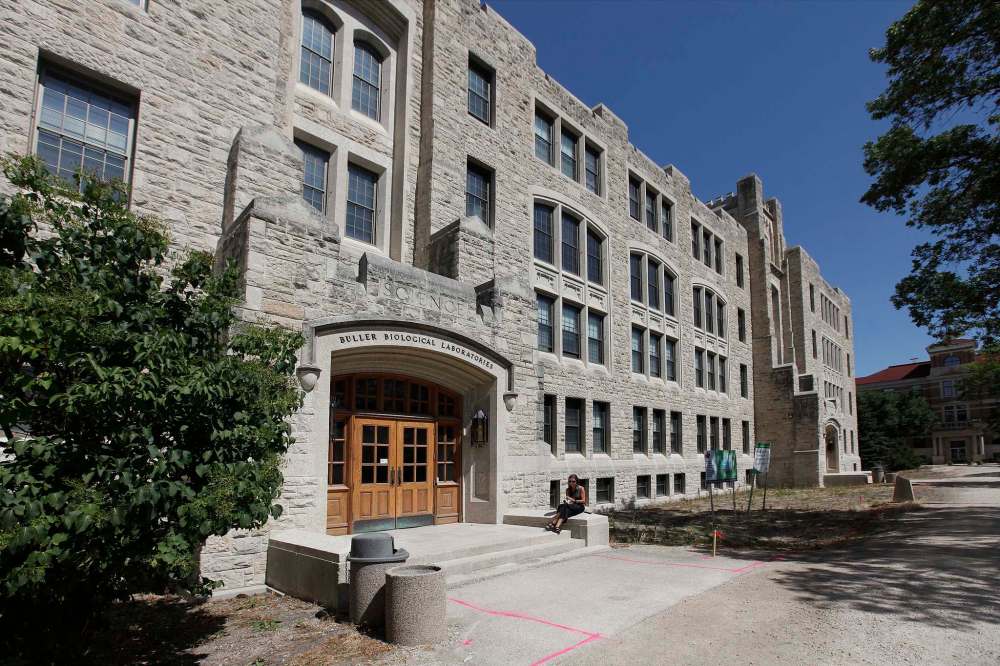Universities integral to Manitoba’s success
Advertisement
Read this article for free:
or
Already have an account? Log in here »
To continue reading, please subscribe:
Monthly Digital Subscription
$0 for the first 4 weeks*
- Enjoy unlimited reading on winnipegfreepress.com
- Read the E-Edition, our digital replica newspaper
- Access News Break, our award-winning app
- Play interactive puzzles
*No charge for 4 weeks then price increases to the regular rate of $19.00 plus GST every four weeks. Offer available to new and qualified returning subscribers only. Cancel any time.
Monthly Digital Subscription
$4.75/week*
- Enjoy unlimited reading on winnipegfreepress.com
- Read the E-Edition, our digital replica newspaper
- Access News Break, our award-winning app
- Play interactive puzzles
*Billed as $19 plus GST every four weeks. Cancel any time.
To continue reading, please subscribe:
Add Free Press access to your Brandon Sun subscription for only an additional
$1 for the first 4 weeks*
*Your next subscription payment will increase by $1.00 and you will be charged $16.99 plus GST for four weeks. After four weeks, your payment will increase to $23.99 plus GST every four weeks.
Read unlimited articles for free today:
or
Already have an account? Log in here »
Hey there, time traveller!
This article was published 27/04/2016 (3477 days ago), so information in it may no longer be current.
How can we create opportunities for our young people, especially those from indigenous communities? What will climate change mean for Manitoba’s communities and what should they do to prepare? What types of construction materials are scientifically proven to last in the province’s extreme climate and how can they reduce the long-term costs of infrastructure? How can we ensure the province has a ready supply of medical isotopes, which are essential in diagnosing cancer? How can we sustain, grow and diversify Manitoba’s rural and urban communities so they are safe and economically strong?
These are a few of the questions guiding the work of some of the world’s best researchers here in Manitoba. Almost everyone agrees education is integral to future success and prosperity (it was clear from the recent provincial election that education is a top priority for most Manitobans). Post-secondary education is not just about preparing students for future jobs; universities also provide the space and infrastructure to collaborate with government, private and non-profit sectors to solve some of society’s most persistent challenges.
University research drives innovation and strengthens the economy. According to Statistics Canada, universities performed more than $13 billion in research and development in 2014, accounting for 40 per cent of total Canadian R&D. That includes research in the business sector to improve competitive advantages, as well as in the non-profit sector. Sound research can and does improve the quality of life for all Canadians.

Manitoba universities are leaders in working with indigenous communities and building pathways to higher education. Currently, there is a gap between the graduation and employment rates of indigenous and non-indigenous Manitobans. First Nations, Métis and Inuit youth are the fastest growing population groups in the province and their full participation in society is essential to Manitoba’s future prosperity.
This is critically important. According to federal government estimates, 70 per cent of jobs created in the coming decade will require some post-secondary education. Our collective path forward includes a skilled and educated indigenous workforce. Manitoba’s universities are working with indigenous people to accomplish this goal while creating an environment that integrates indigenous history, perspectives and knowledge.
The new Progressive Conservative government promoted a vision of a “better” Manitoba that includes opportunities for young people so they can stay in the province and build their careers while contributing to its economic strength.
As Manitoba’s economy continues to evolve, graduates from its institutions are able to consistently adapt to ever-changing environments. Our students learn an important set of skills that have immense value no matter where they are applied. In learning how to solve problems and think critically, we are equipping Manitoba’s graduates to lead, innovate and be successful no matter what changes the future may bring.
Manitoba’s universities are ready to work in collaboration with the new provincial and federal governments, municipalities, indigenous communities, and the private and non-profit sectors to propel Manitoba forward.
David T. Barnard is the current chairman of the Council of Presidents of Universities of Manitoba and the president of the University of Manitoba. Annette Trimbee is the incoming chairwoman of COPUM and president and vice-chancellor of the University of Winnipeg.


